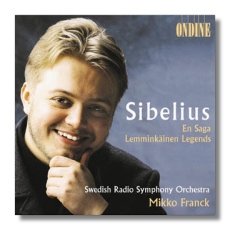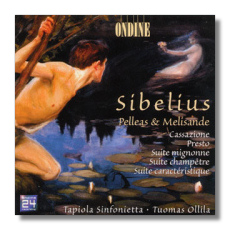
The Internet's Premier Classical Music Source
Related Links
- Sibelius Reviews
- Latest Reviews
- More Reviews
-
By Composer
-
Collections
DVD & Blu-ray
Books
Concert Reviews
Articles/Interviews
Software
Audio
Search Amazon
Recommended Links
Site News
 CD Review
CD Review
Jean Sibelius

Orchestral Music
- En Saga
- Four Lemminkäinen Legends
Swedish Radio Symphony Orchestra/Mikko Franck
Ondine ODE953-2 DDD 73:45


- Pelléas and Mélisande
- Cassazione
- Presto
- Suite mignonne
- Suite champêtre
- Suite caractéristique
Tapiola Sinfonietta/Tuomas Ollila
Ondine ODE952-2 DDD 55:49
Mikko Franck began studying conducting in 1995; in December 1999 he made this recording – a remarkable learning curve! Granted, these are scores that the Swedish Radio Symphony probably is very well acquainted with. Nevertheless, it is an impressive achievement to have come so far in so short a time. En Saga and the four Lemminkäinen Legends are fairly difficult; the conductor needs to shape their narrative structure, and, given Sibelius's scoring techniques, he also needs to balance the orchestral forces carefully.
I grabbed six alternative versions of the Legends from my shelves: Sakari (Naxos), Ormandy (EMI), Vänskä (BIS), Saraste (RCA Victor), Gibson (Chandos), and Foss (Nonesuch – LP only). In all four movements, Franck was slower than any of the above. He takes 53:48 to play the complete work, ten minutes more than Foss, the fastest of the six conductors. Somehow, the music doesn't feel slow. The reason for this, I think, is the precision of the playing; a precise performance with slow tempos always feels better than an approximated performance with faster tempos. That's not to say that the above six conductors commit sloppy sins on their recordings; it's simply that Franck makes us more aware of the crispness and accuracy of the orchestral playing per se. The result is that these are not Legends (nor an En Saga) to get lost in; their details keep catching and arresting the ear. I would have been more satisfied with The Swan of Tuonela if it had been more hushed, however; some of the playing seems too loud and lacking in the ideal amount of internal contrast. This disc is not a safe first recommendation, then, but listeners who enjoy these scores will be fascinated by Franck's conducting, which is not quite controversial, but is certainly illuminating and outside of the norm. (The Legends are done in their more usual order, with The Swan coming second). It's been only four years since Ondine released Leif Segerstam's recording of the Four Legends. Segerstam is freakish, and I suspect that this new CD was released in recognition of that! Ondine has engineered this recording splendidly.
The second CD, with the exception of the incidental music to Pelléas and Mélisande, contains far more unusual works. The Cassazione for full orchestra was composed for the same 1904 concert at which Sibelius's Violin Concerto received its inauspicious première. A cassation is akin to a divertimento; Mozart composed a few early in his career, but it is a relatively unusual genre. Sibelius's 10-minute cassation is in five interlinked sections. The opening and closing sections are stormy, with hints at the beginning of proto-Minimalism such as one also hears in Rakastava, but the internal sections are intimate and spare. It is a pleasant enough work, and it is full of Sibelian touches. The composer was never quite satisfied with it, however, and after a tentative revision, he lay the work aside. It was never published. The Presto for strings alone is an arrangement from circa 1894 of a discarded movement from his Op. 4 String Quartet. This time, the music isn't highly characteristic of Sibelius, but it's an attractive chip from the workbench (and one that taxes the Tapiola Sinfonietta's strings).
The trio of three-movement suites dates from the 1920s. As the name of the Suite mignonne suggests, they're tiny; the longest of the three, Suite champêtre, is only 6:22 on this recording. Edward Elgar wrote salon music, and while it was not very "important" work, he did it with professionalism and affection. The same can be said for these three works. They make no demands on the listener. They ask him simply to lean back and enjoy the music's charm, which ranges between the mildly introspective to the dancelike. Suite champêtre is for strings alone, Suite mignonne adds two flutes, and Suite caractéristique adds a harp. They are charmingly played on this CD.
Sibelius fashioned a nine-movement suite from his incidental music to Maeterlinck's Pelléas et Mélisande, a psychological drama that interested Debussy and Fauré as well. The most famous recording is Beecham's 1955 version with the Royal Philharmonic Orchestra. Ollila and the Tapiola Sinfonietta surpass Beecham on several accounts, however. First of all, the sound on Beecham's recording is dated. Secondly, Beecham's tempos are very slow; they are atmospheric but not very dramatically apt. Ollila assists the music to serve its true function. Thirdly, Beecham omits "By the Sea," a brief but highly charged picture of rough waters; Ollila keeps this number in the suite where it belongs. Yes, Beecham's version has a magic of its own, but Ollila's really is more Sibelian, and more effective as dramatic writing.
Devoted admirers of this composer will want this second Ondine CD for the unusual repertoire, and for Ollila's savvy playing of the music from Pelléas.
Copyright © 2000, Raymond Tuttle




















